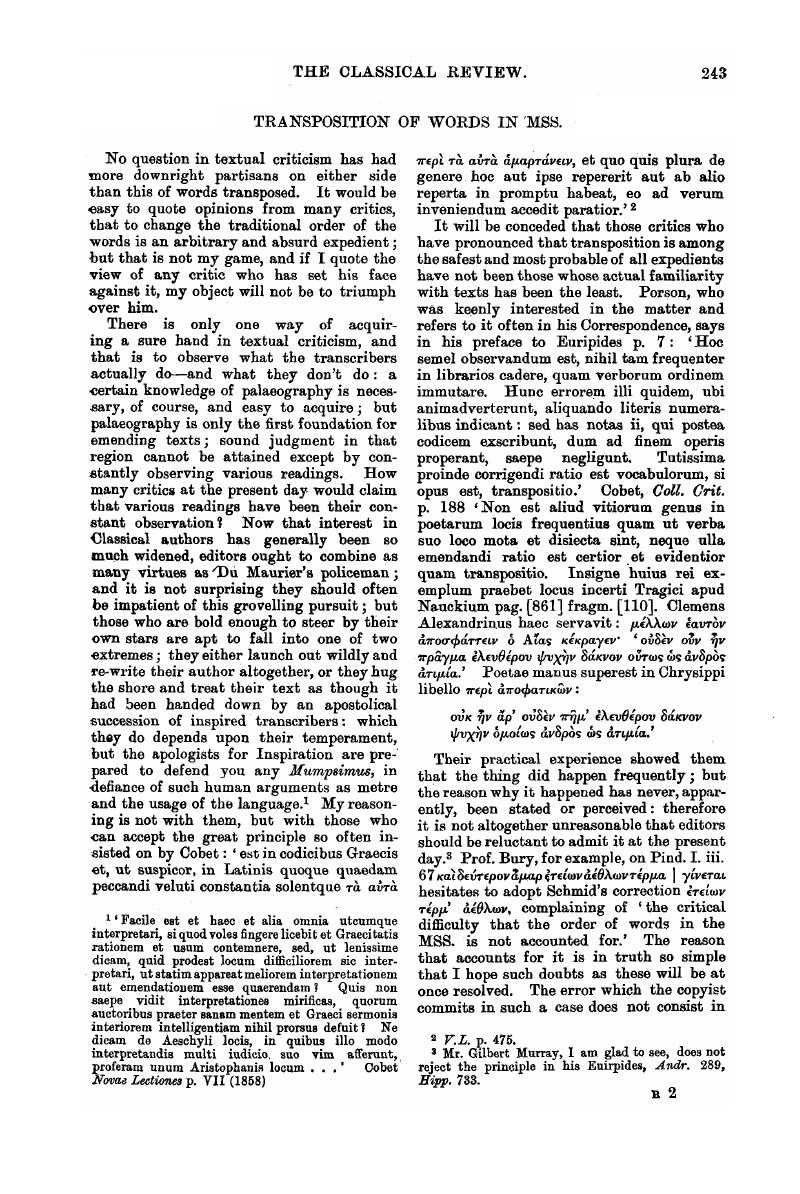Article contents
Transposition of Words in MSS
Published online by Cambridge University Press: 27 October 2009
Abstract

- Type
- Review Article
- Information
- Copyright
- Copyright © The Classical Association 1902
References
1 ‘ Facile est et haec et alia omnia utcumque interpretari, siquod voles fingere licebit et Graecitatis rationem et usurn contemnere, sed, ut lenissime dicam, quid prodest locum difficiliorem sic interpretari, ut statim appareat meliorem interpretationem aut emendationem esse quaerendam? Quis non saepe vidit interpretationes mirificas, quorum auctoribus praeter sanam mentem et Graeci sermonis interiorem intelligeutiam nihil prorsus defuit? Ne dicam de Aeschyli locis, in quibus illo modo interpretandis multi iudicio, suo vim afferunt, proferam unum Aristophanis locum …’ Cobet Novae Lectiones p. VII (1858)
2 V.L. p. 475.
3 MrMurray, ilbert, I am glad to see, does not reject the principle in his Euirpides, Andr. 289Google Scholar, Hipp. 733.
4 There is sometimes an intermediate stage when the particle appears in both places, as 0. T. 976 … 


5 άσιῆς here might suggest that in Alexis B's exclamation 

6 He need not alter the sentence more than is necessary for explanation, and since the stress is not on χρόνον but on 

7 So Prof. Jebb rightly reads: the MS. now has 
8 Bacchyl. i. (15), ix. 38, x. 5, 40, Pind. 0. xii. 19, P. i. 2, 4, 6, iii. 6, iv. 7, N. i. 7, 18, v. 1, x. 6, 18, xi. 5, 12, I. i. 6, v. 6, vi. 25, fr. 133. 5 (ed. Bergk).
9 See Bergk Pindar p. 161. 


10 Some may think it an argument in its favour that 
11 Who must, from their office, be the Ω ρ α ι.
12 Perhaps this should change places with μόλοιτέ for the sake of ‘responsion’ to διἰἀέρος in 1479.
13 But they have been misunderstood; the meaning is ‘who, after making the furthest enquiry in the world, can profess to ham discovered what is God…, when he sees … ’ τíςφησì (Musgrave restored τíς for τí) is common in this use; Trag. fr. adesp. 351, Euphron (Ath. 843 b) III p. 321 Kock, Vesp. 1497, Soph. Aj. 1413, Rhes. 149–154, I.T. 1047 



14 A common division of the enhoplion metre, e.g. Pind. P. xii. 1, 2 and 4, Eur. Med. 684, Soph. Trach. 121.
15 As νóμος δδε in Soph. Ant. 613.
16 The metre is an extension of Glyconic, as in the newly-published piece of Sappho 

17 ὀλέθριος is the prose word nsed in explanation; as in Phoen. 1530 



18 The variants 
19 In Aesoh. Ag. 1461 read 

20 v.l. 
21 ἥμιν or ἥμὶν is required by metre in El. 495 (where I see now that in L ἥμῖν has been, made from ἦμιν), and ὗμιν or ὑμὶν in Trach. 640.
22 In Ewmen. 1008 
23 And 228? phrýgui pulvínar poterat pingere, soliar deiugebat.
- 2
- Cited by


